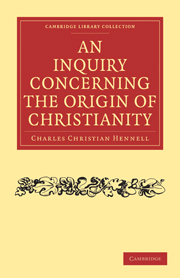Book contents
- Frontmatter
- PREFACE
- Contents
- ERRATA
- CHAPTER I Historical sketch, from the Babylonish captivity to the death of Jesus
- CHAPTER II Historical sketch, continued to the end of the first century
- CHAPTER III On the date and credibility of the Gospel of Matthew
- CHAPTER IV On the date and credibility of the Gospel of Mark
- CHAPTER V On the date and credibility of the Gospel of Luke
- CHAPTER VI On the date and credibility of the Gospel of John
- CHAPTER VII Examination of the accounts of the Resurrection and Ascension
- CHAPTER VIII Remarks on the other miracles in the four Gospels
- CHAPTER IX General objections to the miracles of Jesus
- CHAPTER X Remarks on the miracles in the Acts of the Apostles
- CHAPTER XI On the evidence afforded to the miracles by the apostolic writings
- CHAPTER XII On the prophecies
- CHAPTER XIII On the parts of Isaiah supposed to relate to Christ
- CHAPTER XIV On the book of Daniel
- CHAPTER XV Whether Jesus foretold his own death and resurrection
- CHAPTER XVI On the character, views, and doctrine of Jesus
- CHAPTER XVII Comparison of the precepts of Jesus with the Jewish writings
- CHAPTER XVIII Concluding reflections
- APPENDIX
CHAPTER X - Remarks on the miracles in the Acts of the Apostles
Published online by Cambridge University Press: 05 March 2012
- Frontmatter
- PREFACE
- Contents
- ERRATA
- CHAPTER I Historical sketch, from the Babylonish captivity to the death of Jesus
- CHAPTER II Historical sketch, continued to the end of the first century
- CHAPTER III On the date and credibility of the Gospel of Matthew
- CHAPTER IV On the date and credibility of the Gospel of Mark
- CHAPTER V On the date and credibility of the Gospel of Luke
- CHAPTER VI On the date and credibility of the Gospel of John
- CHAPTER VII Examination of the accounts of the Resurrection and Ascension
- CHAPTER VIII Remarks on the other miracles in the four Gospels
- CHAPTER IX General objections to the miracles of Jesus
- CHAPTER X Remarks on the miracles in the Acts of the Apostles
- CHAPTER XI On the evidence afforded to the miracles by the apostolic writings
- CHAPTER XII On the prophecies
- CHAPTER XIII On the parts of Isaiah supposed to relate to Christ
- CHAPTER XIV On the book of Daniel
- CHAPTER XV Whether Jesus foretold his own death and resurrection
- CHAPTER XVI On the character, views, and doctrine of Jesus
- CHAPTER XVII Comparison of the precepts of Jesus with the Jewish writings
- CHAPTER XVIII Concluding reflections
- APPENDIX
Summary
If the miracles attributed to Jesus himself be false, the same is likely to be the case with those attributed to the Apostles, for they professed to derive whatever power they had from him. Nevertheless, it is more satisfactory to examine such direct evidence as there is for these also.
This evidence rests mainly on the testimony of the author of the Acts, who himself intimates that he is the same as the author of the third Gospel, and who has been supposed by all antiquity to be Luke, the companion of Paul, a man of more education, as appears by his style, than most of the first disciples. If he be the same as Silas, which there are good grounds for supposing, it seems that he joined the church previously to the year 52; for Silas is first mentioned, Acts xv. 22, in connexion with Barsabas, as being a chief man among the brethren. Barsabas was one of those who had companied with the Apostles in the lifetime of Jesus, Acts i. 21; but it is unlikely that Silas (or Luke) had done so, because in his Gospel he only lays claim to having had his information from those who were eye-witnesses from the beginning, and not to have been an eye-witness himself. Therefore it is probable that neither was he an eye-witness of the transactions immediately after the death of Jesus; nor, indeed, till a short time before the council at Jerusalem, A.D. 52, since there are many chasms in his history previously to that date.
- Type
- Chapter
- Information
- An Inquiry Concerning the Origin of Christianity , pp. 194 - 208Publisher: Cambridge University PressPrint publication year: 2010First published in: 1838



